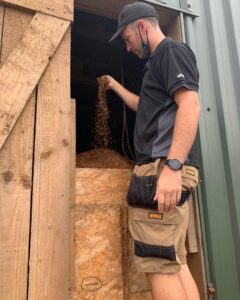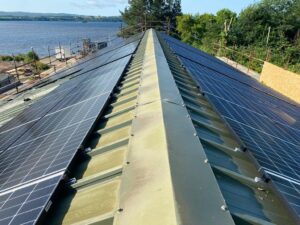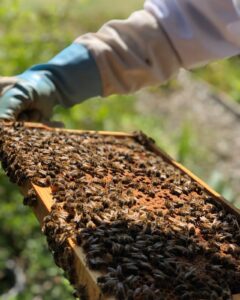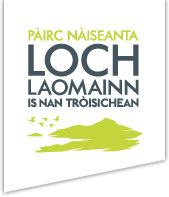
Oak Tree Inn targeting Net Zero by 2040
The Oak Tree Inn is a local tourism business based in Balmaha that has set a target of reaching Net Zero by 2040.
The Fraser family, who run the business, have produced a Net Zero Strategy and have already made strides in their mission, embracing new technologies and taking any challenges head on.
Mindful of being a business that operates in a National Park, the owners are proud to play a part in addressing global issues such as climate change, whilst continuing to develop their business.
Biomass Shed and Solar Panels


In the last few years they have invested heavily in installing a biomass shed and fitting solar panels.
The biomass supplies heating to all areas of the business in Balmaha. This includes The Oak Tree Inn, St Mocha, Village Shop, all staff and guest accommodation and offices. The biomass also heats 3 x 3000 litre water tanks.
Over 200 solar panels produce power for the kitchen, bar, restaurant and refrigeration units. Even on duller days (which we are used to in Scotland) they can still make more than enough electricity to keep things ticking over.
Market Garden & Kitchen Refurbishment

A large polytunnel and vegetable garden is used to grow as many vegetables and herbs as possible for the hotel. Local honey is also sold in the Village Shop. The bees are housed in an apiary in a small orchard, where there is a selection of apple, plum and pear trees. These trees provide fruit for many dishes on the Oak Tree menu. All the peels are composted on site.
A recent refurbishment of the restaurant kitchen has involved replacing all old LPG/gas powered appliances with new energy efficient electric appliances (all but 1 which is used for frying fish). This has made the kitchen environment quite different, much cooler than kitchens of the past.
The addition of a Production Kitchen allows for sustainable preparation of all food products sent to other areas of the business. The food is prepared and then stored in reusable containers, which is delivered to other premises in electric vans.
Coffee Roasting
Loch Lomond Coffee use a fully electric vehicle to gather all used coffee grounds from their coffee shops, these are dried in the biomass shed and then used as fuel and in palm-free natural soap locally made in Cardross.
An example of reduced plastic waste is the 250kg of coffee that is used every week. Previously supplied in 1kg individual bags which is 250kg of packaging going to land fill every week. The coffee is now delivered in reusable containers.
The business is also in the development of recycling all their used coffee grounds, using the biomass unit to process them into coffee logs/bricks/pellets. This solid biofuel is a sustainable, heat-efficient alternative to conventional fossil fuels and will be used in the restaurant fireplace and to heat their sites.
Other added extras
· Recycle all their cardboard using a specially designed machine to compress them into large bales, then take them to recycling plants in their fully electric vehicle.
· The coffee shops all offer and encourage the use of reusable coffee cups, which are recycled from single-use coffee cups by a company called ‘Circular and Co.’
· Staff are each given a reusable coffee cup or mug to use, so they don’t have to use single-use cups.
· Any leftover sliced fruit from the bar garnish trays is dried and used in cocktails.
· Replaced single-use menus with QR codes and an outdoor ordering system using customers own smart devices to avoid unnecessary wastage.
We are tackling a climate emergency and we need to work together to fight it. This work from the Oak Tree Inn’s owners and staff is a great example of a business in the National Park doing just that.

